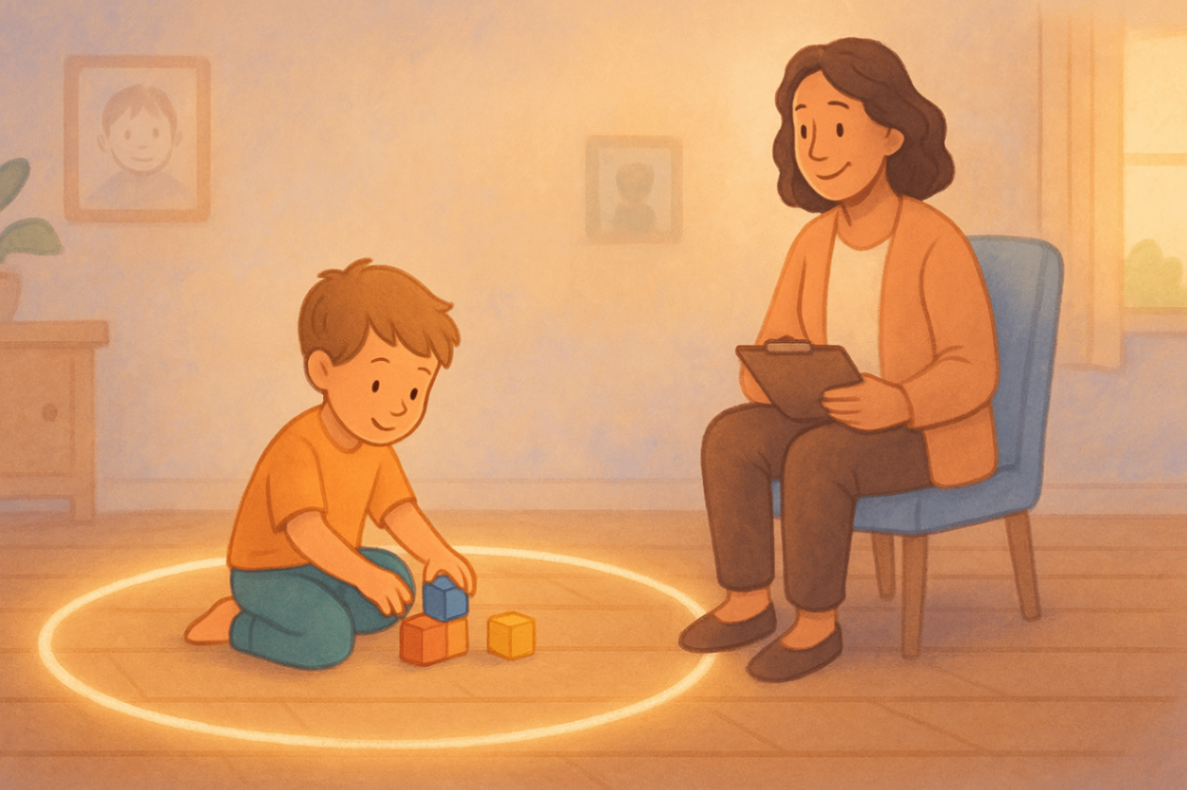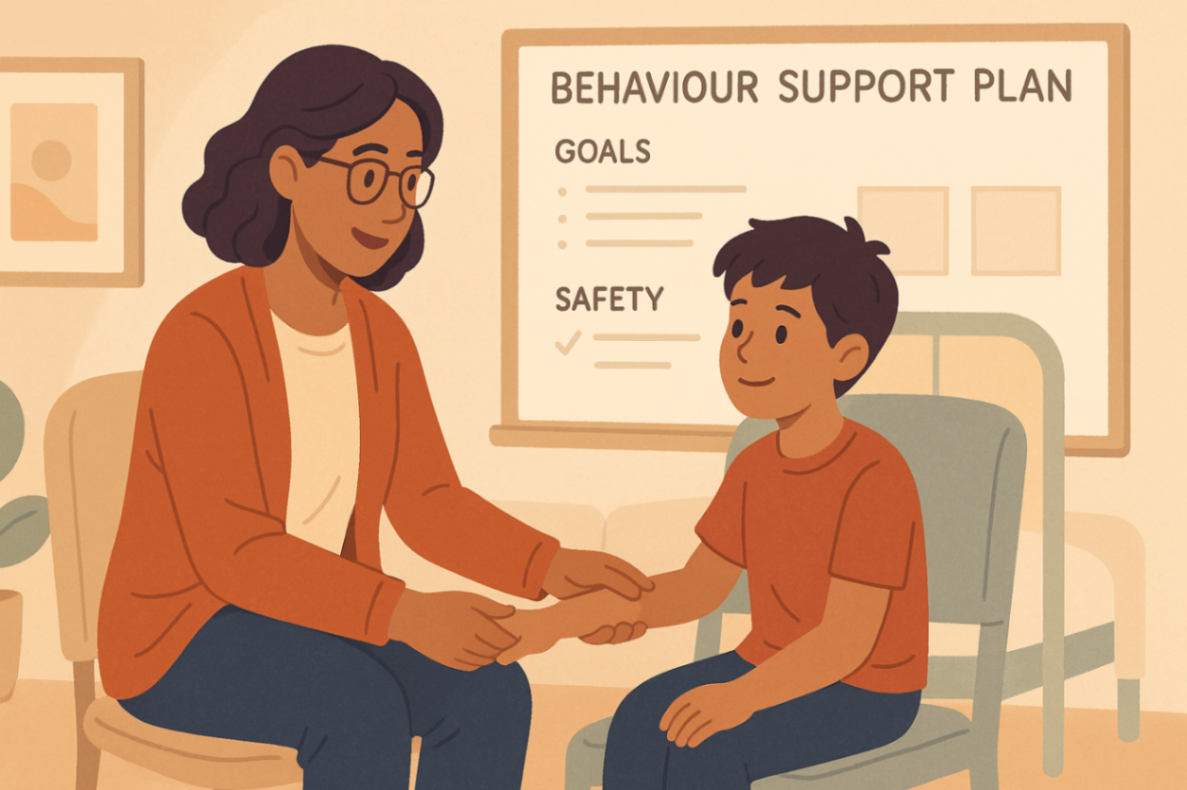
understanding restrictive practices in ndis behaviour support plans
19 June, 2025

Key Highlights
-
Gain insight into restrictive practices and their specific implications within the NDIS framework.
-
Understand the situations where restrictive practices may be considered necessary and their regulated types.
-
Learn how positive behaviour support (PBS) maximises dignity and reduces use of restrictive practices.
-
Explore the role of behaviour assessments in identifying behaviours of concern and creating tailored interventions.
-
See how the NDIS Commission ensures safety, quality, and participants' rights in behaviour support plans.
-
Discover how families, educators, and support workers collaborate for meaningful outcomes.
Introduction
Restrictive practices are crucial in NDIS behaviour support plans, ensuring the safety of individuals with disabilities during challenging behaviours. These plans align with principles of freedom, safety, and respect. Positive behaviour support workers tailor plans to enhance each person's quality of life. The NDIS Commission oversees these practices, aiming for their reduction over time while providing resources to ensure safety and compliance. This blog outlines restrictive practices, their types, safety protocols, and collaborative planning under NDIS guidelines.
Defining Restrictive Practices NDIS
 Restrictive practices limit a person's rights or freedom of movement, typically used when certain behaviours pose safety risks. These measures aim to ensure safety rather than addressing underlying issues or needs. The NDIS carefully regulates all restrictive practices, ensuring they are applied correctly. Its behaviour support system seeks to reduce or eliminate these practices through proven methods, prioritising safety and respect for individual dignity. The NDIS implements essential checks to safeguard individuals while maintaining their freedom of movement.
Restrictive practices limit a person's rights or freedom of movement, typically used when certain behaviours pose safety risks. These measures aim to ensure safety rather than addressing underlying issues or needs. The NDIS carefully regulates all restrictive practices, ensuring they are applied correctly. Its behaviour support system seeks to reduce or eliminate these practices through proven methods, prioritising safety and respect for individual dignity. The NDIS implements essential checks to safeguard individuals while maintaining their freedom of movement.
What Constitutes a Restrictive Practice?
Restrictive practices in an NDIS setting limit a person's freedom of movement or independence, often to prevent behaviours that could harm themselves or others. While intended for safety, their use must be frequently reviewed and align with NDIS quality standards. These regulated practices require proper authorisation and adherence to NDIS Commission rules. Examples include restricting access to certain areas, using physical holds, or locking doors with environmental controls. Although these measures may provide short-term safety, research indicates they can hinder long-term solutions and sometimes exacerbate issues. Therefore, NDIS professionals should prioritise compassionate methods that support freedom of movement while adhering to legal requirements.
Common Types of Restrictive Practices
Restrictive practices under the NDIS fall into five different types. The NDIS says each type should only be used when really needed. You must keep full records and have the right approvals before using them. This keeps people safe and respects their rights. Here is a clear guide to each type:
|
Type of Restrictive Practice |
Description |
|---|---|
|
Seclusion |
Keeping someone away from others or shutting them in one place to help with severe behaviours that can cause harm. |
|
Chemical Restraint |
Giving medicine to change someone's behaviour, sometimes needed for safety or in mental health situations. |
|
Mechanical Restraint |
Using things like straps to limit how much someone can move, just to stop them from hurting themselves or others. |
|
Physical Restraint |
Physically holding or blocking a person from moving, and this is only done if there is no other choice. |
|
Environmental Restraint |
Limiting someone’s access to places or things, for example, locking a room, door, or cupboard so the person cannot get to something that might hurt them. |
Support workers and other professionals have to check often how these restrictive practice interventions are used. We need to remove risks, protect freedom of movement, look after mental health, and follow all NDIS rules. This is the way to keep people safe and make sure everyone is
The Role of Positive Behaviour Support Plan in the NDIS
Positive behaviour support (PBS) is a way to step in early and help people live better lives. It works by looking at why people act a certain way and finding ways to meet their needs with plans made just for them.
Behaviour support practitioners use proven tools. They work together with families, educators, and support workers. By doing this, they help keep people safe, treat everyone with respect, and give them more control over their lives. PBS helps people learn new skills, depend less on strict rules, and brings clear results. This all supports the quality of life and follows NDIS behaviour support guidelines. Let’s look at the principles that guide PBS.
Principles of Positive Behaviour Support (PBS)
Positive Behaviour Support (PBS) focuses on helping individuals grow and improve their lives by emphasising positive behaviours rather than just addressing challenging ones. This approach allows people to learn new skills that enhance their quality of life. Effective support strategies arise from collaborative teams, which may include NDIS behaviour support workers and other specialists. When these teams work together, they can create tailored behaviour intervention plans that prioritise well-being and comply with NDIS Quality and Safeguards Commission standards. Ultimately, PBS fosters better support for individuals facing behavioural challenges through positive reinforcement and skill development.
How PBS Minimises the Need for Restrictive Practices
Positive Behaviour Support (PBS) seeks alternatives to strict rules by understanding the reasons behind certain behaviours. Support workers and practitioners analyse behaviour triggers to develop tailored strategies. PBS emphasises enhancing communication skills, allowing individuals to express their feelings effectively. Collaboration among families, support workers, and practitioners creates a supportive environment that reduces stress and minimises challenging behaviours. For instance, a functional behaviour assessment can uncover underlying causes of acting out, often linked to frustration or unmet needs. PBS fosters new skills for expressing problems, empowering individuals with greater choice and autonomy. With ongoing monitoring and teamwork, reliance on strict measures decreases over time.
When Are Restrictive Practices Considered?
Restrictive practices should be used only when nothing else works and someone could get hurt. If there is real danger to people, and no other way keeps everyone safe, then these steps are taken.
When managing behavioural risk using NDIS rules, there must be good records, the right approvals, and strong monitoring in place. The support teams keep looking for less restrictive ways to help, using PBS strategies as other options. Real-world assessments of behaviour help everyone make the best choices.
Assessing Behaviours of Concern
It is important to understand the many sides of behaviours of concern for good support. A functional behavioural assessment helps you find what sets off these behaviours. It also helps create positive behaviour support strategies that fit each person. This process makes sure that both support workers and ndis behaviour support practitioners are able to help with the special needs of every person. This work is very important for their wellbeing and also lifts their quality of life. When you see and know the patterns in behaviour, you can better understand the people you work with. It also helps lower the risk of harm and gives people the chance to learn new skills inside a supporting place. Having the right positive behaviour support and support strategies helps everyone do well with positive behaviour and also helps the ndis reach its goals.
Criteria for Use and Decision-Making Processes
The use of restrictive practices follows set rules to support good and fair choices. There are some things to look at before using them:
-
Clear Risk of Harm: These practices are only used if someone's actions put the person or others in danger.
-
Authorisation by the NDIS Commission: The ndis commission must give permission for any rules about these actions so that everything is done right.
-
Monitoring Systems: Careful checks help us see if the use of these practices is working well and is safe.
-
Collaborative Support Team: Families, support workers, and those who give care all share their ideas to help make better plans.
These steps help keep the rights and respect of each person safe, while putting safety and openness first. The outcomes are always checked so people do not come to rely too much on the use of restrictive practices by the ndis support team.
Speak to Our Behaviour Support Practitioners in Liverpool
Looking for expert support in managing challenging behaviours? Our team conducts comprehensive functional behaviour assessments and collaborates with support networks to create intervention plans that work. Whether at home, school, or via telehealth, we’re here to help your child build meaningful skills and lasting progress.
Get in touch today to book a personalised consultation with our team — proudly supporting families in Casula, Prestons, Moorebank, Wattle Grove and surrounding suburbs.
Conclusion
Understanding restrictive practices in NDIS behaviour support plans is very important for keeping people safe and respected. It is key to know what these practices mean and always use the ideas behind Positive Behaviour Support (PBS). By putting the well-being of everyone first, we make sure that restrictive practices are used only if there is no other way. Any action taken should fit with what is right and fair. Family and support workers help a lot during this process. They work together so everyone’s rights and needs are looked after. If you want help or have questions, you can talk to our behaviour support practitioners in Liverpool. They can guide you with support that fits your own situation.
Frequently Asked Questions
What are the five NDIS regulated restrictive practices?
The NDIS watches over five types of restrictive practices. These are seclusion, chemical restraint, mechanical restraint, physical restraint, and environmental restraint. The NDIS Commission must give authorisation before anyone uses these methods. They are only used with strict rules. They are there to help manage risky behaviours and to make things safer for people.
Who can approve the use of restrictive practices?
Restrictive practices need to get authorisation from the Safeguards Commission before the NDIS Commission can approve them. Behaviour support workers make special plans that follow ethical rules. The NDIS, Safeguards Commission, and behaviour support people make sure there is transparency and everything is done the right way while putting these plans in place.
How are families involved in behaviour support planning?
Families play an important part in behaviour support planning. They help by sharing what they know about their loved one. This can be about needs, likes, and what is hard for them. When families take part, support strategies can match with family values. This helps everyone work together. It also leads to better outcomes for people who get behaviour support.
What should I do if I’m concerned about the use of restrictive practices?
If you feel worried about restrictive practices, talk to the NDIS Commission. They look after monitoring and give guidance to help. Support workers and those who work with behaviour can help watch what happens. They help to make sure there is wellbeing and that the rules are followed. Always make things clear to keep everyone safe during these actions.
.svg)

















